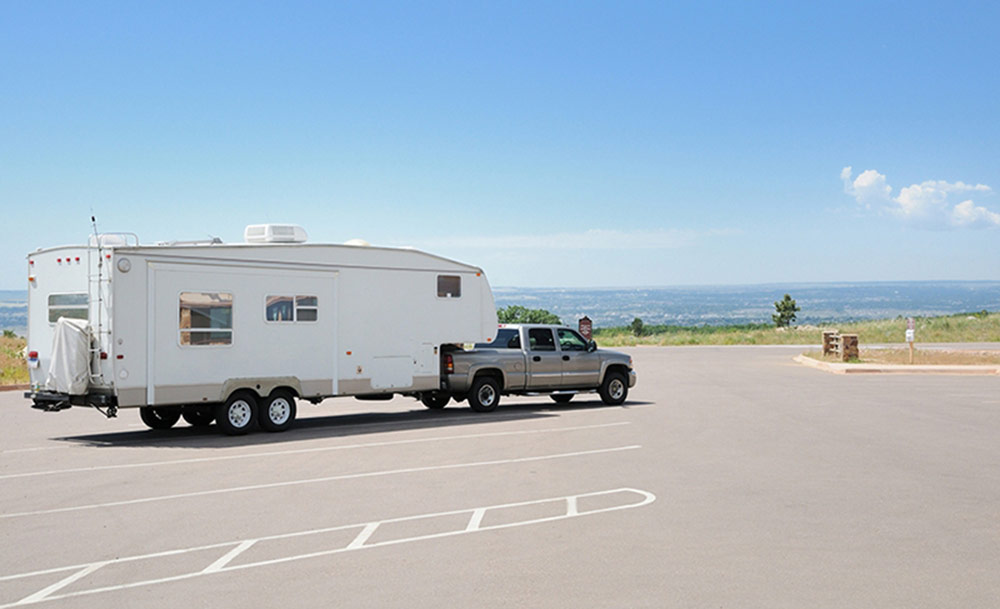Where you can park your caravan

While travelling
The best place to spend the night when travelling is in a designated caravan park. These will provide you with all the amenities you need, including power and bathrooms.
Camp sites and National Parks are also great places to spend the night. You can usually book in advance online.
To avoid fines and to ensure that both your caravan and other vehicles remain safe, aim to limit stopping your van outside of designated caravan park areas.
If you are planning to park outside designated caravan parks, do your research. Check the local council laws and parking regulations in each town or city you plan to visit. Details are available on council websites, under "City Parking".
Do not park your van on a road without street lights, as it may cause an obstruction. Many councils place restrictions on how long a caravan can be stationary for in residential areas or marked parking bays.
You will not be able to live in the caravan when parked on a street. In many council areas, you can only park on the street when loading or unloading, or if your caravan has broken down.
In between trips
Your best bet is to park your caravan in a large garage — whether at your house or in a storage facility — to protect it from the elements. This will also give you an easy place to perform maintenance on your rig between trips.
You may be able to park your caravan on the street in front of your house, as long as it’s not blocking traffic. Local councils have jurisdiction over parking, so check your local council.
Make sure you never park your caravan blocking the street or on the footpath. It’s important to make sure it’s not obstructing anyone, whether other vehicle or pedestrians.
Other considerations include the fact that your caravan may not be covered by insurance if parked on the street.
Avoid tickets
The best thing is to plan out your route in advance to avoid tickets and stress. Create an itinerary and include rough estimates of when you plan to fill up your tank.
Use petrol station stops to refresh supplies, use the bathroom and stretch your legs, to avoid needing to stop and park in residential areas.
Related topics
Things to note
The information in this article has been prepared for general information purposes only and is not intended as legal advice or specific advice to any particular person. Any advice contained in the document is general advice, not intended as legal advice or professional advice and does not take into account any person’s particular circumstances. Before acting on anything based on this advice you should consider its appropriateness to you, having regard to your objectives and needs.
Insurance Products (excluding Travel Insurance) are issued by RACQ Insurance Limited ABN 50 009 704 152 (RACQI) and arranged by its agent, RACQ Distribution Services Pty Ltd (RDS) ABN 35 116 361 650, AFSL 567130 and RDS' authorised representatives (including RACQ Operations Pty Ltd ABN 80 009 663 414, AR No. 234978 (RACQO). Conditions, limits and exclusions apply. RDS and RACQO are in the RACQ group of companies. One of the companies in the RACQ group of companies has a minority shareholding in RACQI.
RDS and RACQO have not taken your personal objectives, circumstances or needs into account when preparing advice regarding insurance products and you will need to consider whether the advice is appropriate for you. Read the Product Disclosure Statement (PDS) and any applicable Supplementary PDS before making a purchase decision on this product. You can also access our Target Market Determinations on this website. RDS receives a commission from RACQI for the policies it arranges. RACQO receives fees paid for services it provides to RDS. Further details about remuneration are available on request prior to purchasing.
Banking and loan products issued by Members Banking Group Limited ABN 83 087 651 054 AFSL/Australian credit licence 241195 trading as RACQ Bank. Terms, conditions, fees, charges and lending policies apply. This is general advice only and may not be right for you. This information does not take your personal objectives, circumstances or needs into account. Read the disclosure documents for your selected product or service, including the Financial Services Guide and the Terms and Conditions, and consider if appropriate for you before deciding.
Except for RACQ Bank, any RACQ entity referred to on this page is not an authorised deposit-taking institution for the purposes of the Banking Act 1959 (Cth). That entity’s obligations do not represent deposits or other liabilities of RACQ Bank. RACQ Bank does not guarantee or otherwise provide assurance in respect of the obligations of that entity, unless noted otherwise.
RACQ Bank subscribes to the Customer Owned Banking Code of Practice which establishes higher standards than the law requires. The Code reflects modern consumer expectations and developments in approaches to issues such as consumer vulnerability, guarantors, and supporting customers through financial hardship. Please read our Customer Owned Banking Code of Practice page for more information.
RACQ Operations Pty Ltd (ABN 80 009 663 414 AR 000234978) and Members Travel Group Pty Ltd (ABN 45 144 538 803 AR 000432492) are acting as an Authorised Representative of the issuer of the insurance, Tokio Marine & Nichido Fire Insurance Co., Ltd. (ABN 80 000 438 291 AFSL 246 548). Any advice set out above is general in nature only, and does not take into account your objectives, financial situation or needs. Before purchasing any travel products, please consider the RACQ Travel Insurance Product Disclosure Statement (PDS) and the Target Market Determinations (TMDs) that apply to these products. Whilst the PDS outlines the Terms and Conditions of these products, the TMDs outline the intended class of customers that comprise the target market for these travel products. This will allow you to consider which products best suit your objectives, financial situation and needs and consider the products appropriateness to your personal circumstances. TMDs also outline matters involving the distribution and the review of these products. The PDS, Supplementary PDS and TMDs for each travel product can be found here.
